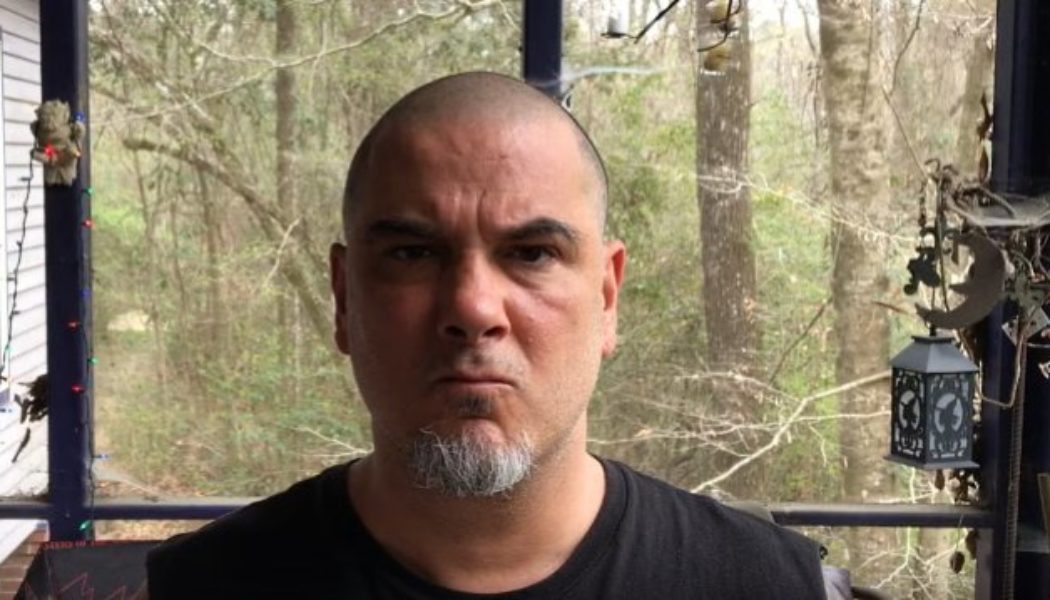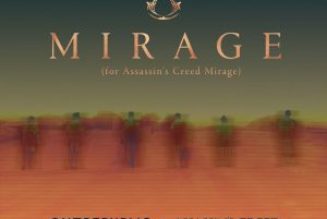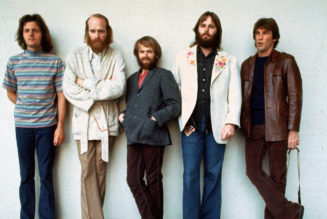
1996’s “The Great Southern Trendkill” is PANTERA‘s most extreme and abrasive album, hands down. Characteristically defiant and contrarian, the band followed up its No. 1 Billboard-charting “Far Beyond Driven” with an LP that was far beyond confrontational — musically experimental, sonically bombastic and lyrically scathing. For the 25th anniversary of the landmark record (released on May 7, 1996), Revolver magazine talked to singer Philip Anselmo about the dark days that inspired such dark music.
Anselmo said (as transcribed by BLABBERMOUTH.NET): “I was in a superbly dark fucking spot when we did that record. And what I remember about doing it was pretty ugly, but I was surrounded by beautiful things. I was in New Orleans. I was at Trent Reznor‘s studio; that place was fucking beautiful and awesome. And [producer] Terry Date was there. And Terry Date would come, fly out to work with me. It was the first record I did away from the band. I was injured, man. I was addicted to drugs. And sometimes when you’re in those dark places, they make for some goddamn good music or interesting expressions of music and art in general.
“I think I felt pretty confident that the songs were devastating enough,” he continued. “I can just leave it at that — I felt like they were devastating. We did some different stuff musically, with the guitar tones and whatnot — cleaner tones and shit like that.”
Philip also talked about “The Great Southern Trendkill” title track, which opened the album in a spectacularly brutal fashion. “It needed to,” he said. “It was like an announcement. That first song was, ‘We have not left our heavy metal roots behind. We have not. And we will not abandon the cause.’ And that’s how we felt about it.”
“The Great Southern Trendkill” was reissued in 2016 for its 20th anniversary. The two-disc “The Great Southern Trendkill: 20th Anniversary Edition” included the original album remastered, plus a dozen previously unreleased mixes, instrumentals, and live recordings.
Five years ago, Anselmo told the “Do You Know Jack?” radio show about the making of “The Great Southern Trendkill”: “Well, it was very interesting times and very trying times as well. On a personal level, I wasn’t doing all that well because I was injured, I was making every rookie mistake in the world with pain medication and all that stuff, and I was embarrassed. I didn’t wanna see anybody, man; I was in a bad way. However, I was present throughout the entire writing of the songs, musically, because I am the lyricist, so therefore shaping a song and getting it into some semblance of song structure, of course, they needed me there for that. But I did decide to do my vocals on my own at Trent Reznor‘s studio that he used to have here in New Orleans which was awesome.”
He continued: “Aside from all of that, I had a journalist just yesterday say, ‘Well, this is kind of a dark-horse record for PANTERA.’ And you know what? I could not disagree with the person. And I still say, yeah, it was a bit of a dark-horse record for PANTERA, because heavy metal, at the time, was supposed to be on its way out. Grunge was the number-one-selling genre at the time. Heavy metal was being experimented with by different bands, in different ways, and, really, from the PANTERA perspective, we really, really, really, really wanted to fly the pure PANTERA style of heavy metal as best we could. And we did. And, you know, I’ll go a bit further and say that right when we… the day we all arrived to meet up and go on our first tour for ‘The Great Southern Trendkill’, our road manager approached me and he said, ‘Phil, you know, man. Don’t expect sold-out shows, man. Heavy metal’s on its way out. Kids are listening to different stuff. And it’s gonna be rough. Don’t expect this. Don’t expect that.’ And I was, like, ‘Great! I appreciate the pep talk.’ But the best thing that remedied this bullshit diatribe was that he was dead wrong. That show — that first show — was packed to the gills, sold out, as were most of the other ones. So fucking in your face opinion.”
Around the same time, PANTERA drummer Vinnie Paul Abbott told “Whiplash”, the KLOS radio show hosted by Full Metal Jackie, that “The Great Southern Trendkill” “was a really crazy record for PANTERA. I mean, it was the most chaotic, most unorganized, most against-the-grain record that we ever made, looking back at it, after being a part of the remastering and everything that was there. That being said, it came out at a time, in 1996, when rap metal was coming in, and I even remember us getting a phone call from the president of our label, saying, ‘Hey, you guys need to… Be sure and start rapping on your record, add some rap to it.’ And we just kind of laughed and said, ‘Okay, we’ll get right on that.’ And anyways, that record was really designed as just a gigantic bird finger to the music industry at that time, and I think it really accomplished what it was all about.”










